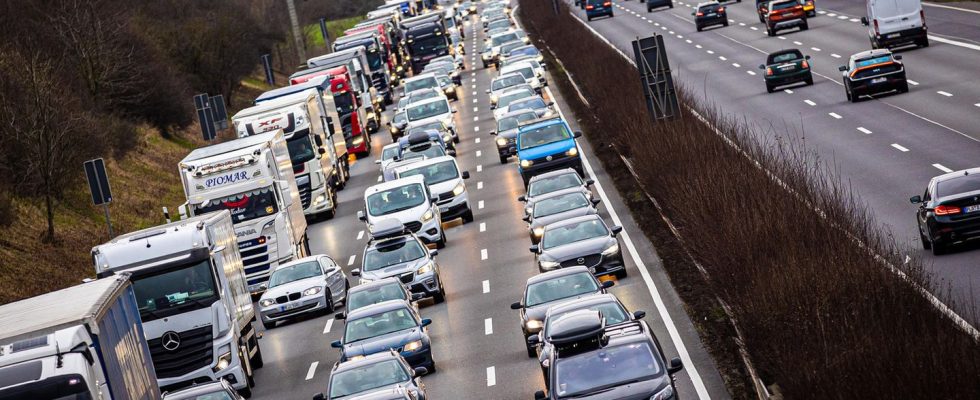Berlin
Debate about driving bans ended: traffic lights agree on climate protection law and solar package
With the agreement on the Climate Protection Act, driving bans for combustion cars, as discussed by Volker Wissing, are now off the table
© Moritz Frankenberg / DPA
After months of negotiations, the government factions have reached an agreement on two legislative proposals, some of which were very controversial.
The parliamentary groups of the SPD, Greens and FDP have agreed on the long-controversial reform of the climate protection law and a package to promote the solar industry. Representatives of the three factions announced this on Monday in Berlin. With the agreement, far-reaching interventions such as weekend driving bans for drivers in order to achieve climate goals in the transport sector are likely to be off the table. Transport Minister Volker Wissing (FDP) threatened this.
“The abolition of the annual sector targets in the Climate Protection Act ensures that there will be no driving bans,” explained FDP parliamentary group deputy Lukas Köhler. “With the change to the Climate Protection Act, we are turning German climate policy upside down, because from now on all that matters is that the climate goals are achieved overall and no longer where emissions are reduced. In 2028, it will also be checked whether the other regulations in the Climate Protection Act can be abolished.”
Climate protection law without sector targets
SPD parliamentary group deputy Matthias Miersch spoke of a breakthrough and emphasized with regard to the climate protection law: “The amendment means that not a single gram of CO2 can be emitted. With the solar package we are at the same time giving important impetus for the expansion of photovoltaics, wind power and biomass.”
Green party deputy Julia Verlinden emphasized: “The new climate protection law obliges the federal government for the first time to set up concrete climate protection measures for the period 2030 to 2040, renews the obligation of each sector and will measure CO2 savings more intelligently. With a view to the much stricter climate target for 2040, it is particularly necessary “More will happen in the area of traffic.”
The solar package is intended to remove bureaucratic hurdles for the expansion of solar energy in Germany and thus advance the expansion. The operation of balcony power plants should become easier, as should the use of self-generated photovoltaic electricity in apartment buildings. The options for solar systems in fields and fields should also be expanded.
Financial support for the domestic solar industry (“resilience bonus”) was recently discussed, but the FDP rejected this. In view of the current misery, several solar companies are considering stopping their production in Germany. The reason given is that Chinese manufacturers flooded the market with modules at dumping prices. “There will be no resilience bonus to subsidize individual companies at the expense of the general public,” explained Köhler. “Instead, people can look forward to significantly less bureaucracy and faster procedures if they want to purchase a solar system.”
Wissing warned of driving bans
The federal cabinet had already passed the reform of the climate protection law last June and the solar package in August. Since then, both have been discussed in the Bundestag – an exceptionally long time. The Greens and the SPD in particular feared that the Climate Protection Act would result in a loss of binding force, and environmental associations criticized the plans as watering down the law.
Hydrogen planes and charging lanterns
Eleven inventions for a sustainable future
The following applies so far: If individual sectors such as transport or buildings fail to meet legal requirements for CO2 emissions, the responsible ministries must submit emergency programs in the following year. With the reform, compliance with climate targets should no longer be monitored retroactively by sector, but should be directed towards the future, over several years and across sectors. If it becomes apparent in two consecutive years that the federal government is not on track to meet its climate target for 2030, it will have to make adjustments. By then, Germany must by law reduce its greenhouse gas emissions by at least 65 percent compared to 1990.

Historic verdict for the Swiss “climate seniors”: Climate protection is now a human right
01:17 minutes
FDP leader Christian Lindner appealed to the Greens on Saturday not to block the reform of the climate protection law. If the Greens do not give up their blockade, “draconian restrictions on freedom up to and including bans on driving combustion engines” would be conceivable in Germany, he said. Wissing had previously warned in a letter to the parliamentary group leaders about cuts for drivers and even driving bans. On Monday, a council of experts on climate issues presented its assessment of Germany’s greenhouse gas emissions. Traffic continues to lag significantly behind when it comes to climate protection.


